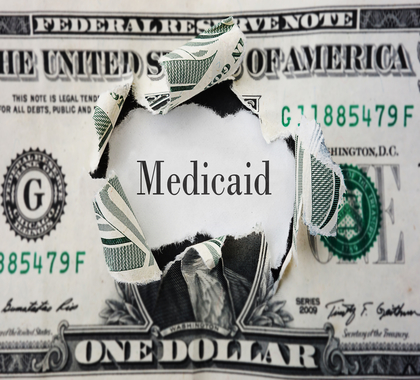Responding to the coronavirus pandemic, Congress passed legislation increasing Medicaid funding and placing restrictions on states’ ability to apply cost-containing measures.
The Families First Coronavirus Response Act (FFCRA), signed into law on March 18, addresses paid sick leave, insurance coverage of coronavirus testing, nutrition assistance, and unemployment benefits.
The new law includes a temporary 6.2 percentage point increase in the Federal Medical Assistance Percentage (FMAP), which is the amount the federal government pays to states for Medicaid costs. The increase was driven by concern that more people would enroll in Medicaid in the wake of rising unemployment and put states under budget pressure during and beyond the coronavirus pandemic.
The FMAP increase is expected to provide the states an additional $9 billion to $10 billion per month in Medicaid funding, according to the Foundation for Government Accountability (FGA).
Strings Attached
The increase in federal money arrives with multiple provisions that may encourage prolonging enrollment of people once they are no longer eligible for the program, a new report states.
Congress’s Medicaid Funding Increase Creates Massive Legal Uncertainty for States During the COVID-19 Crisis, published on April 22 by the FGA, finds the new policy not only creates the potential to expand Medicaid to ineligible people but also introduces legal conflicts for the state and federal governments in trying to clamp down on Medicaid waste, fraud, and abuse.
To receive the aid, states cannot remove ineligible enrollees unless those individuals request a voluntary termination or move out of the state. In addition, states are prohibited from increasing premiums (if they charge them) above the rates that were in effect in January 2020 and cannot tighten eligibility standards or procedures.
‘Going to Spend Carelessly’
These provisions are more restrictive than those attached to any previous increase in the FMAP and will cause a lasting increase in health care spending, Scott Centorino, an FGA senior fellow and coauthor of the report, told Health Care News.
“Congress has created a perfect storm for not only Medicaid and state budgets but also hospitals and health care more broadly,” said Centorino. “By barring states that accept COVID-19 aid from removing anyone on Medicaid even if they’re ineligible or commit fraud, Congress has created a slow-motion, single-payer machine, forcing states to choose between short-term aid or long-term program solvency.
“The writing is on the wall: the Left’s unfinished business from Obamacare is being finished during this COVID-19 pandemic,” said Centorino.
The change drastically compromises Medicaid’s integrity, says Brian Blase, a senior fellow at the Galen Institute and president of Blase Policy Strategies.
“The [new rule] is going to lead to the federal government reimbursing almost all Medicaid spending for the rest of the year,” said Blase on The Heartland Daily Podcast on May 7, 2020. “If a state is spending on the program recognizing that their state taxpayers are going to bear none of the costs or little, they are going to spend carelessly. There is going to be a lot of waste, fraud. and abuse, and it’s going to be a recipe for massive government health care.”
Temporary Could Become Permanent
Blase says a mechanism in a proposal introduced by House Democrats would allow the changes to become permanent, which would greatly increase the cost of Medicaid. The program cost $597.4 billion in 2018, according to the Centers for Medicare & Medicaid Services.
“[Congress] wants Medicaid to be a source of state aid whenever there is an economic downturn,” said Blase. “States are going to become more dependent on this program, and it will weaken incentives for states to be fiscally responsible in managing taxpayer dollars.”
The rule changes put states in a no-win situation, the FGA report states.
“These restrictions and misguided requirements will force states into making impossible choices of accepting COVID-19 aid and putting their Medicaid programs at immediate risk of insolvency or attempting to make their way through the crisis without any of the additional federal funds,” the report states.
Eroding Medicaid’s Integrity
Blase says the changes to Medicaid in response to COVID-19 could jeopardize some of the reforms the Trump administration has taken to maintain the program’s integrity and eliminate accounting gimmicks.
In an April 7, 2020 article in Health Affairs, Blase described a tactic known as “supplemental payments,” in which a state charges a tax to a health care provider, submits the expense to Medicaid, and gives the tax back to the provider in the form of a rebate, developing a “revolving door between consulting groups that create these schemes and state governments and Medicaid agencies.”
“These arrangements lead to high salaries for executives at hospitals, nursing homes, insurance companies, and consulting groups,” wrote Blase. “Many providers, particularly those with less political clout, are harmed by these financing gimmicks and suffer from Medicaid’s generally low payment rates.”
Kelsey Hackem, J.D. (khackem@gmail.com) writes from the state of Washington.
Internet Info:
Scott Centorino and Chase Martin, “Congress’s Medicaid Funding Increase Creates Massive Legal Uncertainty for States During the COVID-19 Crisis,” Foundation for Government Accountability, April 11, 2020: https://www.heartland.org/publications-resources/publications/congresss-medicaid-funding-increase-creates-massive-legal-uncertainty-for-states-during-covid-19-crisis
“How Congress is Using Health Care to Slow Down the Recovery (Guest: Brian Blase),” The Heartland Daily Podcast,May 7, 2020: https://www.heartland.org/multimedia/podcasts/how-congress-is-using-health-care-to-slow-down-recovery-guest-brian-blase






















[…] rest of the 2020 fiscal year. Unlike spending on government operations, permanent programs such as Social Security and Medicare do not require appropriations or authorization on a continuing […]